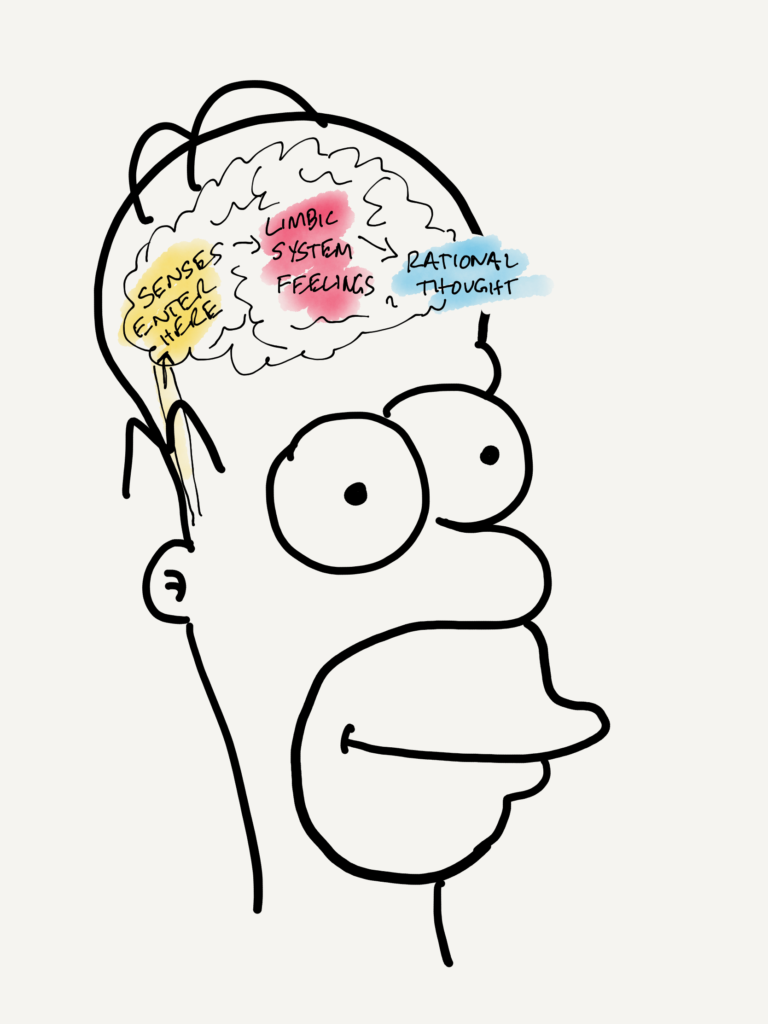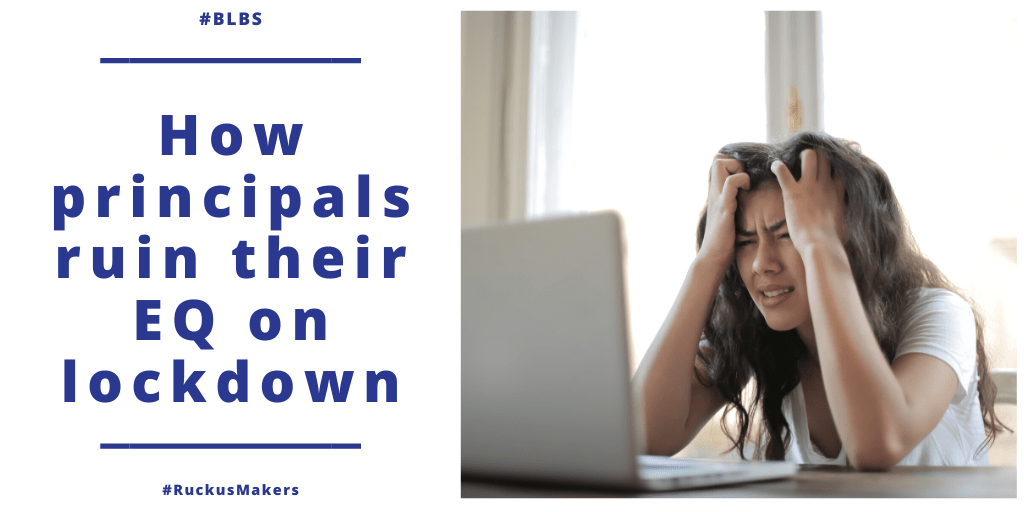“Your EQ is the foundation for a host of critical skills — it impacts most everything you say and do each day. EQ is so critical to success that it accounts for 58 percent of performance in all types of jobs.”
-Travis Bradberry and Jean Greaves
Intense emotions dictate our actions. Unchecked they will lead you to serious consequences.
Rational leaders are more effective than emotional ones.
The problem is that everything that happens in the world must first travel through the limbic system in our brain (where we feel) before it gets to where we process rational thought.

The most effective school principals have a highly developed EQ and are aware of how their emotions influence their thoughts and actions.
During a pandemic, emotions are running even higher and emotional intelligence is essential to your success.
Avoid these pitfalls that can ruin your EQ, effectiveness, and influence.
Boost your EQ by asking yourself these 3 questions every morning.
Curious to know the questions? Send us your email below and we’ll deliver them straight to your inbox!
Unchecked emotions
Problem: Many leaders are unaware of how their emotions impact their school. The fact is you are a meteorologist. How you “show up” impacts the weather in your school. Your negative energy will impact the performance of your staff.
High energy negative emotions are toxic (e.g. anger, aggression, tense) but so are low energy negative emotions (gloomy, suspicious, depressed).
Solution: Take frequent breaks. Build-in some margin to your day so you don’t run from meeting-to-meeting. Check-in with yourself and consider:
How am I feeling right now? Is this the type of energy I want to bring to this meeting?
Don’t take things personally
Problem: Every comment, every look, every everything has little to do with you. I love this Toltec wisdom from Don Miguel Ruiz:
“Nothing others do is because of you. What others say and do is a projection of their own reality, their own dream. When you are immune to the opinions and actions of others, you won’t be the victim of needless suffering.”
Solution: Stop caring about what others think of you. Use a square squad instead.
Everything is important
Problem: Treating all tasks as equal. Your priorities and goals are not the same as your staff’s priorities and goals. I usually prescribe a “less is more” philosophy to the leaders I coach. Now is a great time to implement that perspective. Treating all tasks as equal shows a lack of prioritization and will stress your team out.
Solution: Show your team what they can cut, what needs to be done perfectly, and what things can be done with 50% effort (that is a strategy used by elite performers). Have you ever watched Lionel Messi play football? He reserves his energy for the exact time to give maximum effort and that is why he is arguably the best footballer in the world. The rest of the time, he is walking or jogging around the pitch.
Living in a bubble
Problem: Do you exist in your own little world? On one side you may come across as aloof and uncaring. The other side is reserved for people with such large personalities, they dominate everything which causes others to feel annoyed, frustrated, or overwhelmed.
Solution: Ask yourself, “Why am I doing this right now? How is it impacting others?”
Quick on the draw
Problem: You say what you’re thinking too quickly. This happens often in heated situations when the stakes are high or when a leader feels too comfortable.
I made this mistake years ago as an AP. The principal was sharing an idea on some project. I disagreed with what he was thinking and blurted out in front of colleagues and parents, “That’s a TERRIBLE idea.” That embarrassed the principal and made me look bad. He had a conversation with me afterward and I’ll never forget that lesson.
Solution: Count to ten. Even though I was right (it was a TERRIBLE idea), I could have provided criticism in a more tactful manner. Counting to ten would have allowed me to note that this wasn’t the time or place to share my perspective. The problem was that I was too comfortable. The principal valued my candor (I was the only one who would tell him when he had a bad idea), but I hadn’t yet learned the importance of timing and environment.
Boost your EQ by asking yourself these 3 questions every morning.
Curious to know the questions? Send us your email below and we’ll deliver them straight to your inbox!
Playing Whack-a-Mole
Problem: Being reactive is a terrible strategy for successful leadership. During a crisis, it is easy to be reactive and to treat everything as urgent. This is also a recipe for 12+ hour workdays and a dejected staff.
Solution: Schedule time in your day (even just 15 minutes) to problem solve. Before schools closed, I encouraged the leaders I coach to plan for schools to be closed. As of today, I am challenging leaders to plan for school to be out until January 2021. This is because I believe in the Stockdale Paradox. It is better to be 50% optimist and 50% realist in a time like now. Give your staff and students a day off a week from classes in order to prepare for next year.
Can’t separate the forest from the trees
Problem: Some leaders get so focused on one thing they miss the bigger picture. This frustrates team members because the leader is insensitive to what is going on around her as she misses the social cues and perspective of the team.
Solution: Before going all-in on a project and hammering out all the details it is useful to check in with your team. Another great strategy would be to conduct a premortem before seeing a project through. This activity asks individuals to list all the reasons a project will fail before starting. It uncovers blind spots and helps teams plan for the worst before investing too much energy and resources.
Discounting opposing point of views
Problem: Not everyone is going to agree with your ideas as a leader. That’s a good thing, it makes you better. If you write off individuals who disagree with you and stop listening, you will hurt your relationships, erode trust, and diminish your ability to get candid responses.
Solution: Thank people for their perspective, even when they disagree. Reflect back what you hear so you re-enforce that you understand where they are coming from.
Your face betrays you
Problem: You rarely smile or when someone says something poorly you roll your eyes or commit other body language fouls.
Solution: Smile more. Now that we are 100% working in a virtual environment we have the advantage of seeing what our face is saying (even when we are not talking). The other day I was listening to a mindfulness teaching. The gist was this: What if we brought more focus, energy, and positivity to our next difficult task? Maybe even to one that we were putting off?
That was a powerful reframe. Imagine how much better your meetings and work would be if you consciously decided to bring 10% more positivity and energy to a task. What if you treated the next difficult situation with a lighter or playful spirit? Do you think it would end up better or worse?
If you enjoyed this post, you probably would like this one on self-awareness.
I also highly recommend Emotional Intelligence 2.0 for its concise description of EQ and practical activities that you can begin immediately. We read it in the mastermind during SY 19-20 and it was one of the best books of the year.



